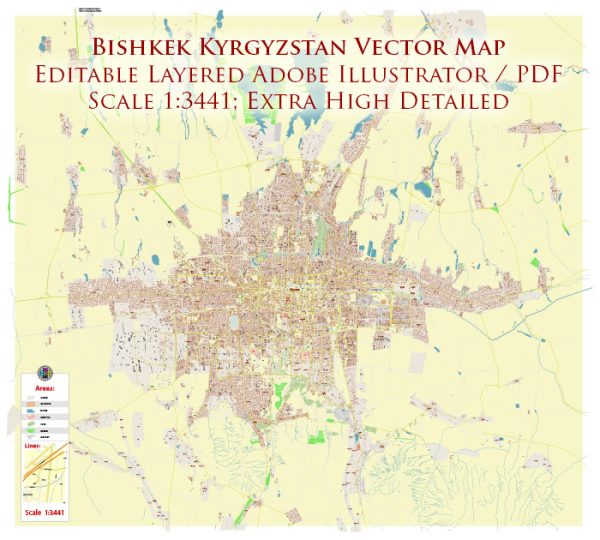A general overview of the economic and transportation aspects of Bishkek, Kyrgyzstan.
Vectormap.Net provide you with the most accurate and up-to-date vector maps in Adobe Illustrator, PDF and other formats, designed for editing and printing. Please read the vector map descriptions carefully.
Economic Overview:
- Key Sectors:
- Services: The services sector is a significant contributor to Bishkek’s economy, including finance, trade, and tourism.
- Industry: Industries such as mining and manufacturing play a role in the economy, with the country’s rich mineral resources contributing to mining activities.
- Trade and Investment:
- Kyrgyzstan, including Bishkek, has been working to attract foreign investment, especially in sectors like mining, agriculture, and energy.
- Trade partnerships with neighboring countries, as well as initiatives like the Eurasian Economic Union (EEU), influence economic activities.
- Remittances:
- Kyrgyzstan receives a substantial amount of remittances from its citizens working abroad, particularly in Russia. This inflow significantly impacts the country’s economy, including Bishkek.
Transportation Overview:
- Road Infrastructure:
- Bishkek has a network of roads and highways connecting it to various parts of Kyrgyzstan. However, the quality of roads may vary.
- The road infrastructure is essential for internal transportation as well as for facilitating trade and transit with neighboring countries.
- Public Transportation:
- Bishkek has a public transportation system that includes buses and marshrutkas (shared minivans). Public transportation is a common and affordable way for residents to move around the city.
- Airport:
- Manas International Airport, located near Bishkek, serves as a major hub for international and domestic flights. It plays a crucial role in connecting Kyrgyzstan to other countries.
- Railways:
- Kyrgyzstan has a railway system, but the coverage is limited compared to road transportation. The rail network connects Bishkek with other cities and extends to neighboring countries.
- Challenges:
- The challenging mountainous terrain in certain regions of Kyrgyzstan can pose difficulties for transportation infrastructure development.
- Economic and political factors may impact transportation projects and overall connectivity.
- Trade Routes:
- Bishkek’s strategic location in Central Asia positions it as a potential hub for trade routes connecting China, Kazakhstan, Uzbekistan, and other neighboring countries.
Please note that the details provided here are based on available information, and there may have been changes or developments in the economic and transportation sectors in Bishkek.


 Author: Kirill Shrayber, Ph.D. FRGS
Author: Kirill Shrayber, Ph.D. FRGS